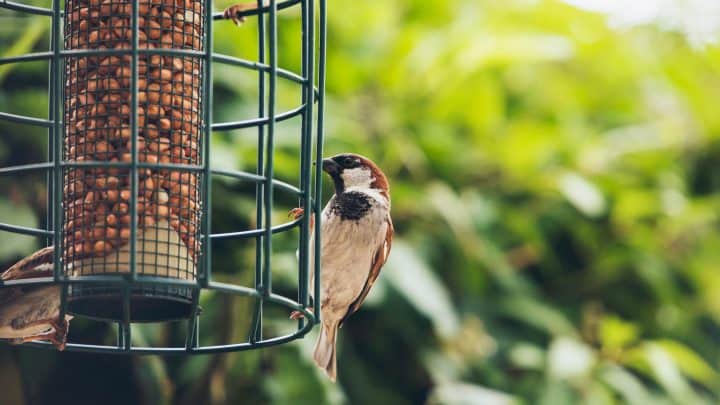There’s no doubt that bird feeding is a popular hobby as homeowners spend more resources to attract birds to their backyards. However, some studies have revealed that bird feeders could also have negative impacts on ecosystems as well as the birds themselves.
So, are bird feeders good for your garden?
Generally, bird feeders are a net positive for your garden since they enhance pollination, increase biodiversity, and add aesthetic value — among other benefits. However, bird feeding can situationally have adverse effects on gardens and wild birds. Hence, it’s essential to practice safe bird feeding to minimize these negative effects.
Bird feeding is an incredible way to ‘welcome’ nature into your home. This article will discuss a few topics related to bird feeders, including their pros and cons. Read on to learn how to practice safe and effective bird feeding.
Advantages of Bird Feeders
Bird feeding hasn’t become a coveted gardening practice worldwide for nothing. Research findings have shown that attracting birds to your outdoor space boosts your psychological, physical, and social health.
Moreover, offering a helping hand to our feathery friends also improves their well-being. Nevertheless, what are the pros of having bird feeders in our backyards and neighborhoods?
The advantages of bird feeding include ecosystem benefits like improved biodiversity and weed and pest control. More selfishly, having birds visit your garden provides a stress-relieving environment for you while feeding birds improves their health and well-being, which in turn increases their population.
Now, let’s look at these benefits in detail:
Birds Boost Pollination
How does it feel to have a ton of flowers, fruit trees, shrubs, and berry bushes in your backyard? It’s breathtaking to have a wide array of plants in our environment as it promotes a healthy ecosystem.
And we have birds (and other pollinators) to thank for pollinating our flowers and fostering this biodiversity.
So, having bird feeders in your compound will attract bird species that pollinate flowers. Here are some examples of pollinator birds:
- Orioles
- Hummingbirds
- Sunbirds
- Spiderhunters
- Honeycreepers and honeyeaters
Thus, bird enthusiasts have a massive advantage since bird pollination (ornithophily) is beneficial to our environment and well-being. Apart from promoting biodiversity, pollination boosts food productivity and income generation for market gardens.
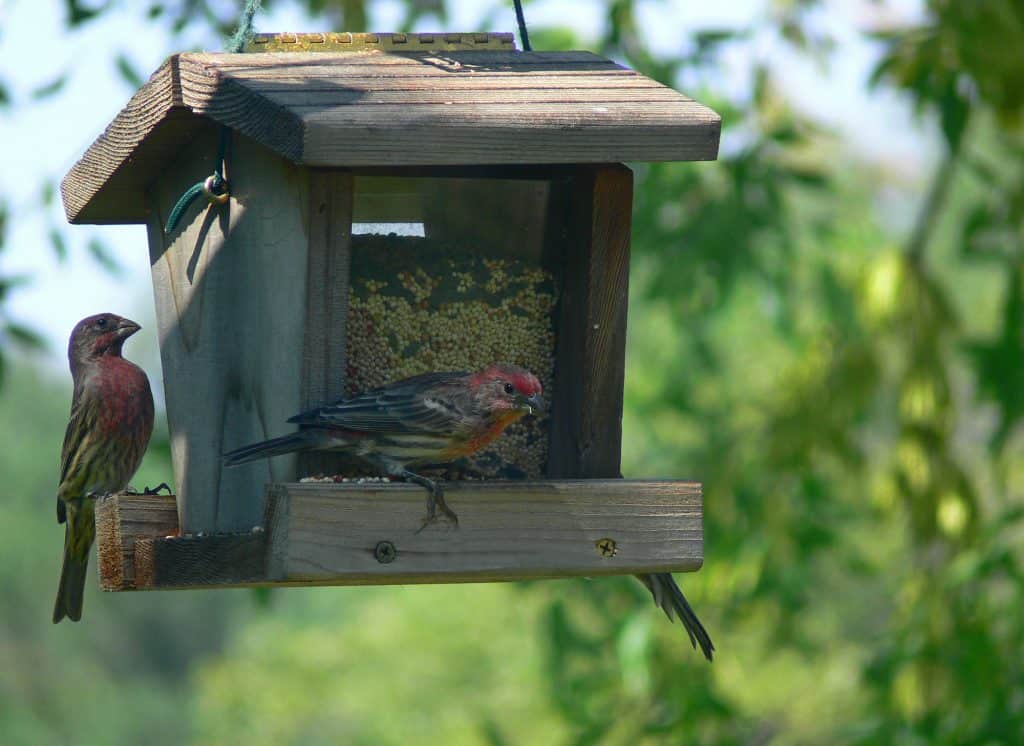
Bird Feeders Improve Your Property’s Aesthetic Value
Incorporating bird feeders into your backyard will undoubtedly attract various wild bird species. And attracting these interesting birds means that you also need to make the landscape accommodative enough to suit their needs.
Therefore, you’ll have to install bird baths (and keep them clean), plant flowering and seed-bearing foliage, have a source of clean drinking water, and bring in bird-friendly structures (such as nest boxes and birdbaths).
A bird-friendly garden (or backyard) should be well-maintained. Moreover, proper care and maintenance will result in a beautiful landscape with numerous flowers, cherry bushes, trees, and other native plants — the perfect backdrop for your feathered friends to showcase their true beauty.
A property with birds and plant diversity will arguably have a higher aesthetic value than one without. So, this curb appeal might increase its selling price if you need to relocate in the future. Furthermore, it also improves the neighborhood’s atmosphere.
Bird Feeding Helps in Weed Control
If you’ve been scratching your head for a natural way to do away with weeds in your garden, you might consider investing in bird feeders.
Some bird species feed on various kinds of seeds, including weed seeds. Seed-eating birds such as finches, sparrows, and towhees have proven effective in weed control as they attack weeds in their seedling stage.
Seed-eating birds help in minimizing the growth of weeds, including:
- Pigeon grass
- Ragweed
- Bindweed
- Smartweed
- Crabgrass
- Lamb’s quarters
Birds Help in Pest and Rodent Control
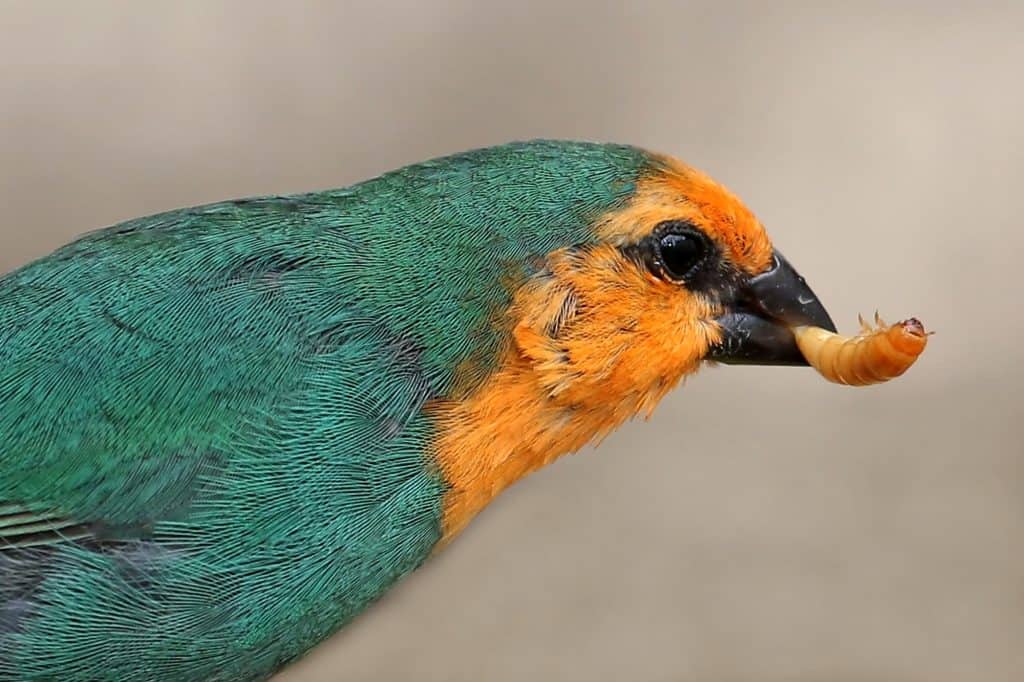
Apart from destroying weeds, birds can also help in keeping some pests and rodents at bay. For instance, many birds eat insects and bugs, including:
- Cucumber beetles
- Aphids
- Mosquitoes
- Cabbage worms
Thus, having bird feeders to attract insect-feeding birds such as swallows is an environmentally-friendly and cheap method of protecting your tomato plants and other veggies from garden pests.
Birds also play a significant role in eliminating snails, slugs, and spiders. Moreover, larger birds, including kites, hawks, and eagles, will assist you in getting rid of unwelcome rodents and reptiles such as mice, voles, rats, and snakes.
Make no mistake, your vegetable garden will be a safer place for plants with more birds around.
Bird Visitations Create a Stress Relieving Environment
Who doesn’t love getting away from the stress, hustles, and bustles of life? If you live in an urban area and have a garden, bird feeding could be ideal for rewinding and bonding with nature. Various studies have shown that the pleasure of interacting with birds is one factor that motivates people to feed birds.
Other findings have revealed the psychological benefits of feeding birds, including mood improvement and stress relief. For instance, it feels incredible to sit on a garden bench, taking in some fresh air, hearing the birds chirp as you watch them flying to and from your compound.
Furthermore, hanging out with your kids in the backyard is the perfect opportunity to allow them to learn about different bird species. And this will instill in them some values, such as appreciating nature and conserving the environment.
Bird Feeding Is Beneficial to Wild Birds
Some seasons can be challenging, making it hard for birds to find food. Hence, offering a helping hand provides food to many bird species. However, bird feeding isn’t limited to specific times of the year since some birds also love supplemental feeding even when food is abundant.
Research has shown that supplementary feeding boosts the well-being of wild birds. Creating bird feeders and nest boxes in your garden or backyard will also provide a habitat for your feathery friends.
Therefore, you’ll be contributing to environmental conservation and biodiversity.
What Are the Cons of Having Bird Feeders?
Having bird feeders can adversely affect the birds, your garden, and the environment. For example, some bird species compete for food and habitat, leading to a population decrease of some birds. Also, bird feeding can increase the transmission of diseases.
Let’s look at these cons in detail:
Bird Feeding Promotes Spread of Diseases
Bird feeders attract various bird species to a common destination. However, this makes the feeding site a perfect location for transmitting diseases among many birds. Disease transmission occurs when one ill bird leaves bodily fluids (containing pathogens) on the feeder and other birds contact them.
Therefore, failing to clean and disinfect your bird feeders will increase the chances of spreading diseases among birds. For example, a study from the University of Georgia showed that bird feeding contributed to the spread of Trichomoniasis and Mycoplasmal conjunctivitis (House Finch Eye Disease) in birds.
It Causes Imbalance in Nature
Bird feeders attract a wide array of birds. And some bird species are more competitive than others. Therefore, the interaction of domineering and ‘weaker’ birds can lead to unhealthy competition for food and habitat.
For instance, a UK-based study on bird feeders showed that the population of some bird species, including ring-necked parakeets, great tits, and Eurasian nuthatches, increased significantly. Contrastingly, the number of marsh tits and wood warblers reduced significantly.
Thus, this competition may cause a natural imbalance as it may eventually wipe out some bird species.
Bird feeding can also have adverse effects on vegetation. For instance, bird poop falling on leaves and flowers can diminish their beauty and inhibit growth. Moreover, sunflower seed shells produce toxins that repel the growth of some plants (allelopathy).
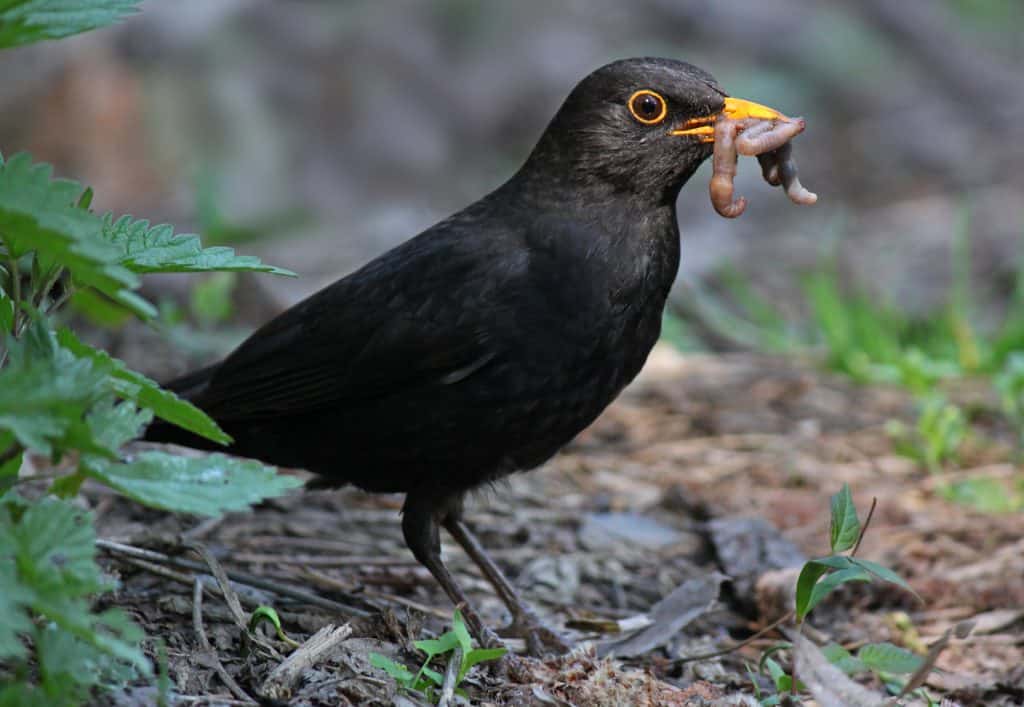
It Promotes Loss of Natural Behavior
Birds typically find food from natural sources, including plants and animals. Additionally, they portray some behaviors such as migration when food reserves can’t sustain them. However, bird feeding has altered this behavior, although people do it with good intentions.
For instance, some researchers have found out that Spanish white storks don’t migrate to Africa during winter as they used to. Alternatively, they prefer living and breeding around areas where they can acquire food.
Bird Feeders Attract Invasive Wildlife
The bird feeders in your backyard will attract birds and other wildlife as well. Other invasive species that love seeds, including rodents, deers, and bears, will find these food-dense locations appealing.
The increased bird population in your garden might also attract nest predators that feed on these birds, such as snakes, raccoons, and squirrels.
How To Make Bird Feeding Beneficial to Your Garden
We’ve established that bird feeding has both benefits and shortcomings. However, the advantages may outweigh the adverse effects if people adopt safe bird feeding practices. Hence, you can make bird feeding beneficial to your garden and your feathery friends by:
- Cleaning and sterilizing bird feeders: This will minimize the spread of pathogens and diseases.
- Using different bird feeders, bird feed, and feeding styles: Since bird species have specific diets and feeding methods, this will help attract various bird species. And it will promote biodiversity.
- Avoiding pesticides: Pesticides have toxic chemicals that can harm birds when they pollinate flowers in your garden. Hence, avoiding them will create a bird-friendly environment.
- Planting natural bird feeders: You can make your garden a haven for alternative food sources for your feathery friends by planting native fruit trees, seed-bearing shrubs, grasses, trees, and berry bushes.
- Using natural pest repellants: It’s best to use non-chemical methods of keeping away pests from your backyard. Examples include setting traps, planting pest-repelling plants, practicing crop rotation, and improving the bird feeder designs. Removing debris from bird seed will also discourage pests from hiding and eating from such sites.
- Use husk-free bird seed: Buying husk-free bird seed will minimize the accumulation of husk debris in your garden. Moreover, since some seed shells repel the growth of plants, taking this approach will promote biodiversity.
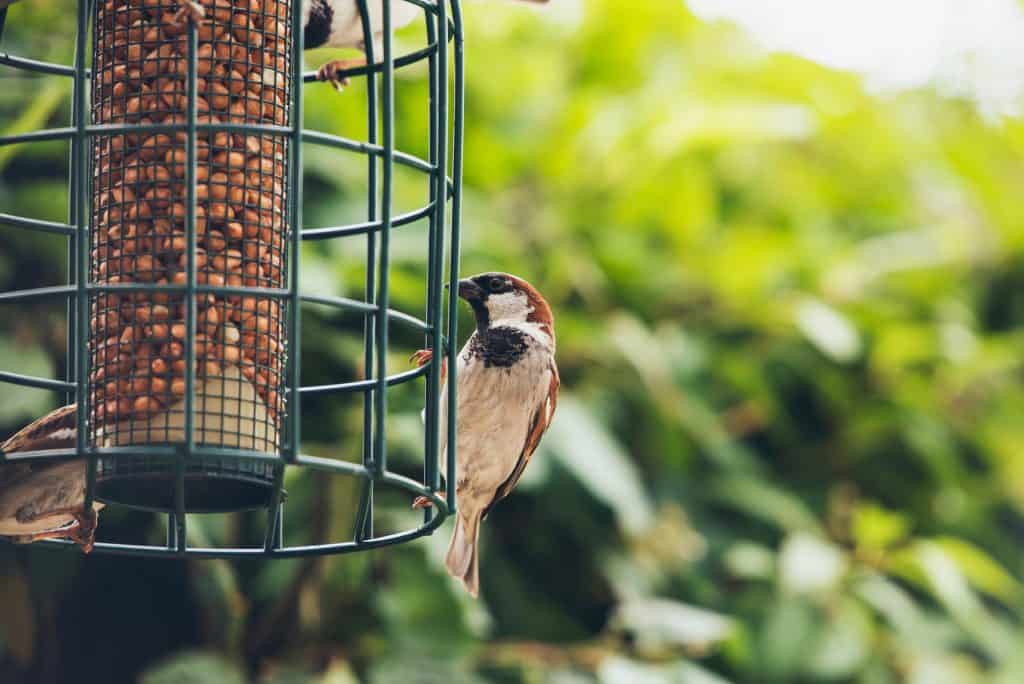
Final Thoughts
Although bird feeding is rampant worldwide due to its numerous benefits, improper bird feeding habits can adversely affect the birds and the environment.
The good news, however, is that bird feeders can be suitable for your garden if you practice safe and proper bird feeding.
Sources
- NCBI: Likeability of Garden Birds: Importance of Species Knowledge & Richness in Connecting People to Nature
- NCBI: Effects of bird-feeding activities on the health of wild birds
- USDA Natural Resources Conservation Service – Pennsylvania: The Importance of Pollinators
- University of California, Agriculture and Natural Resources: Birds – The Pollen Nation
- Brooklyn Botanic Garden: Twelve Ways to Design a Bird-friendly Garden
- USDA National Agricultural Library Digital Collections: Birds as Weed Destroyers
- ResearchGate: Exploring the motivations for garden bird feeding in south-east England
- Audubon: To Feed, or Not to Feed
- Feederwatch: House Finch Eye Disease
- Michigan Department of Natural Resources: Trichomoniasis
- Scientific American: Bird Feeders Are Good for Some Species—But Possibly Bad for Others
- Fundacion Iberdrola Espana: The SEO/Birdlife Migra Programme reveals changes in the migratory behaviour of the white stork
- NestWatch: Dealing with Predators
- Chicago Tribune: Sunflower hulls from bird seed can inhibit growth under feeders
- Preparedness Mama: Natural Garden Pest Control Methods

